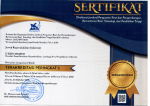SUPPORTING URBAN POOR FACING CLIMATE CHANGE: CREATING EFFECTIVE ADAPTATION MESSAGES (MENDUKUNG MASYARAKAT MISKIN KOTA MENGHADAPI PERUBAHAN IKLIM: MENYUSUN PESAN ADAPTASI YANG EFEKTIF)
Abstract
Government, international agencies, civic society, and media organizations in Indonesia have communicated climate change to people. The examples are communication campaigns focusing on “green” activities, such as bike to work, car-free days, and energy-efficient buildings. One simple question arises in the practice: could these types of communication reach and provide benefits for the most vulnerable group? This paper offers an overview of urban poor audience needs of information, particularly on what media they use, who they talk to and trust, and how they would like Information delivered to them. As an exercise in crafting messages, women in urban poor will be put as the priority audience. This group falls into the struggling segment (41%). They are experiencing the most impact and cannot take much action. The struggling is willing to make changes, but lack of information and support prevents them from taking action. By understanding this sort of information, it will support delivering effective climate change adaptation messages. The methods included in this research are in-depth interviews, focus group discussion, and survey to 928 urban poor in Indonesia.
Keywords
Full Text:
PDFReferences
Adger, W. 2003. Social capital, collective action and adaptation to climate change. Econ Geogr, 387-404.
Bankoff, G. 2003. Cultures of disaster,society and natural hazard in the Philipines. London: Routledge Curzon.
Ford, J., Knight, M., & Pearce, T. 2013. Assesing the'usability'of climate change research for decision making : a case study of the
Canadian International Polar . Global Environmental Change, 1317-1326.
Huq, Saleemul & Ayers, Jessica. 2007.Critical list: the 100 nations most vulnerable to climate change. Sustainable Development Opinion. International Institute for Environment and
Development, London.
Intergovernmental Panel on Climate Change (IPCC). 2001. Climate Change 2001 : impacts, adaptation and vulnerability. Cambridge:
Cambridge University Press.
International Panel on Climate Change. 2007. Impacts, adaptation and vulnerablity :Working Group II contribution to the Fourth Asessment Report of the IPCC (Climate Change 2007). Cambridge: Cambridge University Press.
Maxwell, J. A. 2006. Qualitative Research Design: An Interactive Approach ( 2nd ed.). Thousand Islands: Sage.
Shanahan, M. 2007. Talking about a revolution : climate change and the media. London: International Institute for Environment and Development.
Stern, N. 2007. The economics of climate Change. Cambridge: Cambridge University Press.
UN Data. 2013. Poverty headcount ratio in national poverty line. Retrieved from http://data.un.org
DOI: https://doi.org/10.14203/jki.v9i2.42
Copyright (c) 2016 Jurnal Kependudukan Indonesia

This work is licensed under a Creative Commons Attribution-NonCommercial-ShareAlike 4.0 International License.
-----------------------------------------------------------------------------------------------------------------------------
Research Center for Population, Indonesian Institute of Sciences
Widya Graha Building, 7th and 10th floors
Jl. Jenderal Gatot Subroto 10 Jakarta Selatan, Telp (021) 5221687
Website: http:/kependudukan.lipi.go.id;
E-Journal: http://ejurnal.kependudukan.lipi.go.id
Pustaka: http://pustaka.kependudukan.lipi.go.id
-----------------------------------------------------------------------------------------------------------------------------








